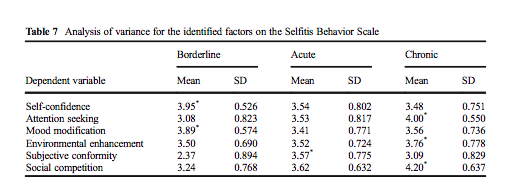Your friend who cannot seem to control the impulse to post a lot of selfies might actually have a psychological disorder according to a new study published in the International Journal of Mental Health and Addiction.
Two psychologists, Mark D. Griffiths and Janarthanan Balakrishnan, interviewed and observed the social media behavior of 225 college students at Indian universities to establish three levels of selfie addiction: borderline, acute, and chronic.
Those who take three selfies in a day but don’t post them on social media fall into the borderline category. Those who post at least three per day are considered acute, and those who have an “uncontrollable urge” to take selfies all the time and post at least six on social media per day are considered chronic.
Griffiths and Balakrishnan suggest “selfitis” should possibly be considered another category of “technological addiction.” The term “selfitis” and the three levels of addiction were first laid out in a 2014 spoof article, which they used as a jumping off point.
They decided to survey students in India is because that county has the most Facebook users, and because India accounts for the highest number of selfie-related deaths. Out of 127 selfie-related deaths that have been reported worldwide, 76 occurred in India.
Researchers then surveyed 400 additional university students about their selfie habits and asked them to mark if they agreed or disagreed with statements such as, “I feel more popular when I post my selfies on social media,” and, “I feel confident when I take a selfie.”
They found that students who exhibited chronic selfie behavior were less confident and admitted to posting selfies because they felt they had to compete with others to get attention online.

The study is not without its limitations and readers should take the results with a grain of salt, as the study relied entirely on voluntary, self-reporting data. Griffiths and Balakrishnan wrote that they hoped their study would serve as a helpful guide for additional research on selfies and addiction, but said it is not intended to be the end-all-be-all on the topic.









